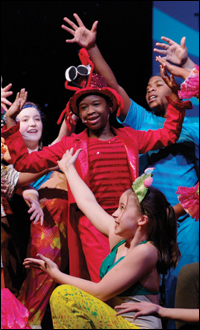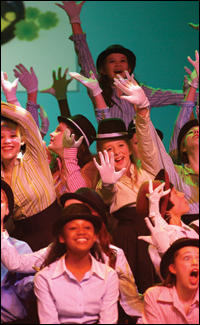
*
In the mid 1990s, Arthur Laurents and Stephen Sondheim — two giants of the American theatre who, among many other credits, collaborated on West Side Story and Gypsy — posed a question to Freddie Gershon, the CEO of Music Theatre International: Where was the next generation of theatregoers going to come from?
The musical's decline from pop culture was apparent. "How could you miss it?" says Sondheim even now. "It's been going on for 40 years." The absence hadn't gone unnoticed by Gershon, either. "When I grew up, Broadway musicals were on the radio," he recalls. "The Billboard hits of the 1950s and '60s were the shows of Broadway. The Top Ten songs were 'Stranger in Paradise,' 'Steam Heat' and 'You Gotta Have Heart.' That was the music of America. You can't hear it now."
With that in mind, Gershon came up with the answer: bring Broadway to the next generation. Gershon enlisted artists whose work he represented at MTI — Sondheim, Golden Era songwriters Jerry Bock and Sheldon Harnick, the next generation of writers like Jeanine Tesori, Stephen Schwartz, Lynn Ahrens and Stephen Flaherty — to reshape some of their most popular titles into a revolutionary model called "Broadway Junior." Through the Broadway JR. program, a "great big Broadway show" gets streamlined into a manageable hour-long version for young people. That version — along with everything else kids need to produce it, like scripts, accompaniment CDs and director's guides — is then purchased and performed by schools across the country.
Wicked composer Schwartz, who has two musicals in the Broadway JR. series, says, "For kids not brought up in New York or where professional theatre is being done, Broadway JR. can have life-changing impact. My parents took me to see a Broadway show at seven years old, and for better or worse, it set my future course because I fell in love with it."
| |
 |
|
| The Little Mermaid JR. | ||
| Marcus Woollen/MTI |
Even before the arrival of Broadway JR., the Great White Way was rarely the end of the road for a given musical; a show's creators were often aware that it would live on to be performed by schools and theatres across the world. "It keeps you honest," says Tesori. "You're not relying on technology. You think, 'Can a grade school do this? Can people with just a piano and felt do this?' It's a wonderful litmus test for a writer."
As Sondheim recalls telling his Into the Woods collaborator James Lapine, "I said, 'If this show works it will be done in schools and for kids forever and ever.' The intention of [Into the Woods] was to do a show for Broadway, but also a show that would have a longer life in schools than most shows do."
That longer life has now been given to other Broadway shows that might otherwise have seemed too intimidating or difficult for a school setting. Broadway JR. titles go through a series of readings and workshops with young performers; in most cases, the writers are involved as much as possible. Schwartz calls it "the equivalent of an out-of-town try-out. It's a delicate process to do it correctly."
Musicals like Seussical and The Little Mermaid, which debuted on Broadway in large-scale commercial productions, take on a new luster when performed by young actors who put imagination, heart and simple storytelling first. Those shows are now among the catalogue's hottest titles.
| |
 |
|
| Finian's Rainbow JR. | ||
| Marcus Woollen/MTI |
Broadway JR. is changing the role of arts in the American educational system and igniting the fire of a new generation of theatre lovers. Kids accustomed to afternoon cartoons or sports practice are now adding the rhymes of Stephen Sondheim and Sheldon Harnick to their vocabulary. Broadway JR. also garnered Gershon a 2012 Tony Award Honor for Excellence.
The success doesn't surprise Sondheim, who points out that despite the lure of television, video games and technology, "the only thing that there has never been a substitute for is the putting on of a show."
A wide grin spreads across Gershon's face as he recalls his days as an entertainment lawyer working on the original Broadway production of Evita. "In the musical they say, 'Get them while they're young, Evita, get them while they're young,'" he laughs.
Turning serious, Gershon adds, "Putting on a school musical is not a frivolous thing. It's part of education. It requires imagination, creativity and inventiveness. To create something out of nothing on a bare stage — that's a miracle. You never know what that's going to do for someone. Because without that first vision, there are no innovators."
For more information, visit MTIShows.com.
The feature appears in the August 2012 issue of Playbill magazine.










